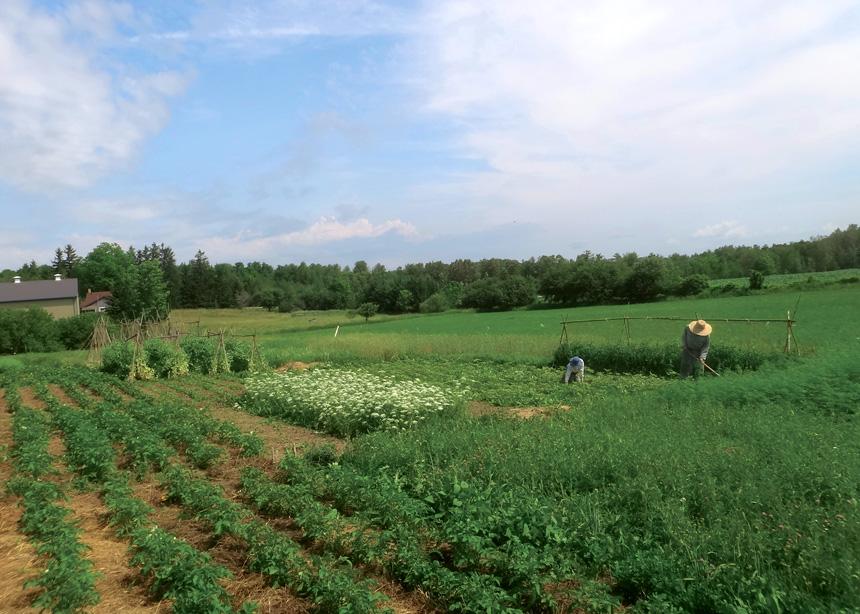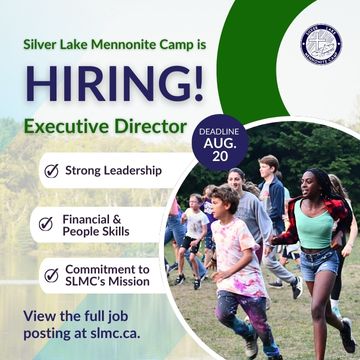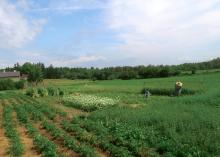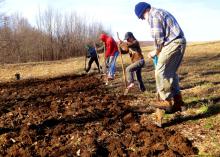As I write this, we are in the midst of planting our garden. But don’t get the wrong image; when I say garden, I mean a field worked by hand to grow our own food.
We grow not just vegetables, but also dietary staples that provide our carbohydrates and proteins, as well as some non-food crops. Over the years, we’ve grown and raised an increasing amount of our staples—including spelt, poultry and livestock—but in ways that are heavily reliant on fossil fuels, both for our tractor and for the production of livestock feed we buy.
You could call this food local and organic, but it isn’t sustainable.
The changes we’ve made are a good start but aren’t enough. We are still very much in process.
As we reduce tractor reliance, we’re trying to go from a 0.8-acre garden to a full acre this spring using only human power and spades. That will take about 120 person-hours of digging.
Another part of the work is altering our diet—toward more dry legumes, maize and potatoes—measuring what we use, working out yields from last year, projecting crop budgets and planning garden areas and rotation to move toward meeting that budget. It’s a long road because it’s a big project.
From personal to systemic
This is action on a personal level to address the environmental problems and injustices in the world. Individual action is often criticized as an insufficient response. If, by “individual action,” we mean a few symbolic tweaks to our consumption patterns, it definitely is insufficient, but I want to reframe the conversation from individual versus political action to old systems versus reimagined systems, and to make a case for how personal action helps make that shift to new systems.
Our lives are so dependent on fossil fuels that it might be said that everything we have is made from oil. Many of us agree this is not sustainable.
Fewer people would accept that this means our personal lives need to change significantly. Instead, we may focus on demanding that governments and corporations limit or ban fossil-fuel-based products.
While the use of fossil fuels must end, the things we need still have to come from somewhere. The way of producing the things we need is what I mean by a system, a way of life.
It is possible that science will find some other resources to exploit, which will not be sustainable, but which, if we’re privileged enough, will let us continue in the direction we are going for a while longer, though still at someone else’s cost. Holding on to our lifestyle in this way is a refusal to care about what will happen in other times and places; it is basically sticking to the old system.
If we risk caring, we realize that what we need is not to tweak the old system but to change systems—to find a new way to live. This new system must be a way by which we all could live.
How do we change systems?
One system we are all familiar with is our own family system, in which each member has a role. While this system often keeps family members from changing, it is also true that if one member changes, that shifts the system.
When there is a problem, and we want our family system to change, often the best strategy is not to try to change someone else, but to change how we work in the system. It is not that we are to blame for the problem, but that because we are part of a problematic pattern, changing ourselves breaks the pattern.
Toward healthy systems
With respect to the environment and injustice, we are in the system which keeps us from changing, but the system is also made up of us. It is disingenuous to cast ourselves as helpless victims of the system. We can make personal changes. I think the issue is more that, for those of us who are privileged, change in the right direction will cost us something.
The system works for us; at the same time, there are many signs the system is sick. Climate change is just one of them.
If we want to replace that system with a healthy system, we must accept and expect a personal cost, and perhaps even see it as a sign that we’re headed in the right direction. The great opportunity we have is that we can begin to act now. By beginning to act on a personal level we can be imaginative. If, as Marcus Rempel suggested in a March 29 letter to the editor, we are addicted to fossil fuels, then asking governments and corporations to shut them down is to go the route of Prohibition, and that won’t help if we don’t find sobriety in our own lives.
Finding crops which work well to plant, harvest, store and prepare by hand takes a lot of creativity. The government imposing a carbon tax on farm inputs won’t help us to do that creative work.
By beginning to act on a personal level we can adapt what we do to our local circumstances. Centralized approaches tend to standardize, to prescribe. The specifics of how we live in Southwestern Ontario will not always suit elsewhere.
By beginning to act on a personal level we can change based on choice, not coercion. This is not only more palatable for the changer, but produces the deeper change that is necessary: in our hearts and minds.
When we choose to change, we aren’t just toeing someone else’s line but are trying to satisfy ourselves that we are doing what we need to do. That’s why we’re taking on those 120 hours of digging rather than taking various problematic shortcuts.
By contrast, political solutions often settle for the lowest common denominator. A political compromise tries to get as many people as possible to commit to doing as little as possible, and that means we won’t go deep enough in re-evaluating how we do things.
By beginning to act on a personal level, we can move in the right direction. When we begin to live in new ways we will know what would be helpful for the law to restrict or promote.
Our experience indicates we have much more land than we need for our family, but to have more people living on and from this land would mean very different land-use policies than those geared to urban intensification.
Our need for each other
While our action is personal, it is not individualistic. We are mutually dependent, both physically and socially. Creating a new culture is hard work. We need to do it together.
This comes with a change in the understanding of salvation. Salvation is not primarily about saving me from the consequences of my own folly so that I’ll be okay, but about us being redeemed so that, with God’s help, we can stop living in ways that got us into this mess in the first place, so that all things will be okay. Instead of calling on God or government to “fix” climate change with new technology that still exploits the earth and other people, salvation enables us to live into a new system, a new way of life.
In this understanding of salvation, our household is a means of grace for me. I find grace through physical enablement— sharing the work—through challenge, through accountability and through support. We are being saved with each other, by means of each other, into God’s will for all. We are grateful for all who join us in this.





Comments
Your efforts are admirable, but negative events are increasing at such a rate that survival is now the main issue, in my opinion. We won't much change systems, but rather endure or not endure their collapses. They'll soon mostly fail or be ghosts of their former selves, it seems.
Those who reflect on what this means in terms of how we obtain food and so on, and are doing something about it, stand the best chance of surviving and being able to help others. Cooperation, gardening, chickens, barter, keeping our supply chains very local and many other things are hallmarks of positive approaches.
Seed-saving and alternative energy are important. Wind, solar and other things which make us more independent of society's energy supplies. Small tractors, tillers and other things can run on bio-gas, wood-gas or steam. We also need tools and know-how to do things via elbow grease alone, as you're doing. Any tech can fail, but simpler tools and methods usually don't.
Many things are now important, but few people are doing them, so many will suffer and die. The best time to reduce that outcome by changing how we live was decades ago. The second best time is now. As millions now agree, after a long hard times period humanity will rebuild, developing much better systems.
Add new comment
Canadian Mennonite invites comments and encourages constructive discussion about our content. Actual full names (first and last) are required. Comments are moderated and may be edited. They will not appear online until approved and will be posted during business hours. Some comments may be reproduced in print.